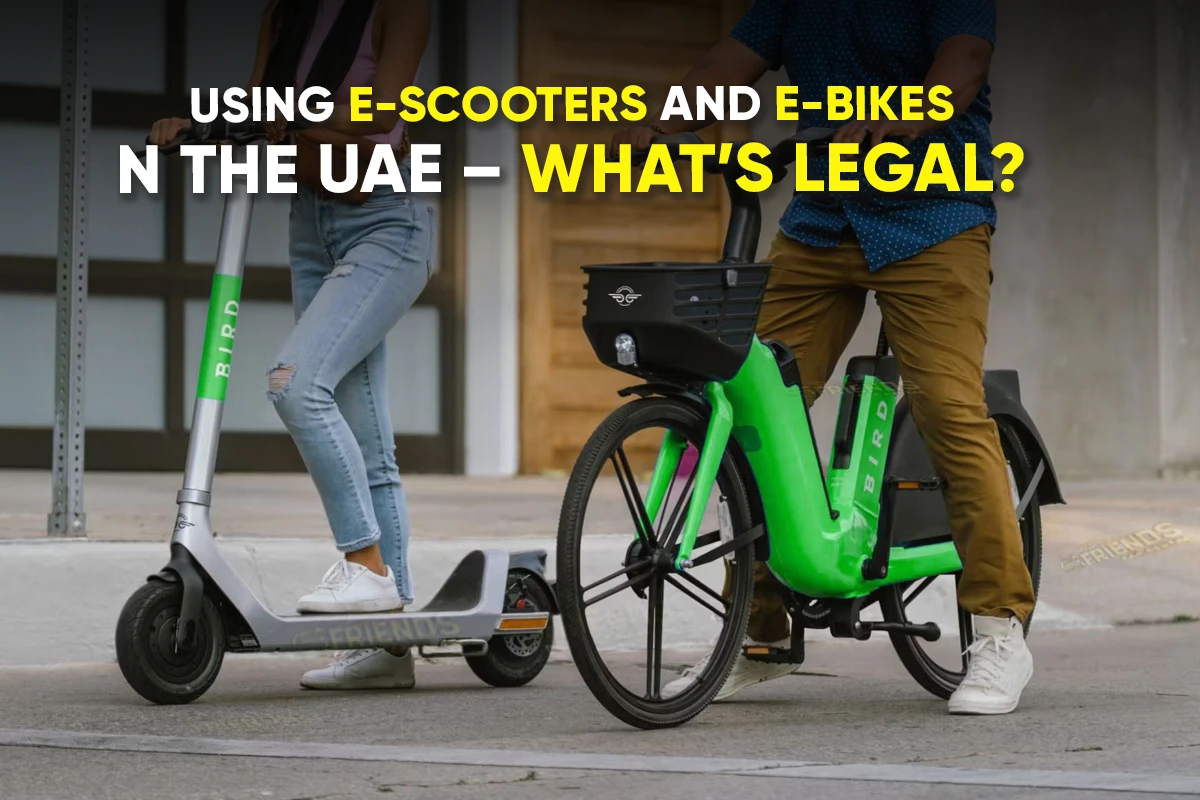Are E-Scooters & E-Bikes Use Legal in the UAE?

Here’s everything you must know before using E-Scooters and E-Bikes in the UAE — learn what’s legal & navigate the bustling Emirates cities stress-free.
The UAE is accelerating towards a greener & sustainable urban mobility with (electric vehicles) EVs at the heart of it. Playing a crucial role in this futuristic nation-wide goal are e-scooters and e-bikes, redefining micromobility with seamless navigation within its bustling cities.
From Dubai’s buzzing tourist hubs to Abu Dhabi’s serene corniches, these eco-friendly rides promise convenience—but only if you navigate the legal landscape. This guide unravels the rules governing e-scooter and e-bike use in the UAE. It delivers clear, actionable insights for residents, tourists, and urban planners. Learn to stay compliant and ride confidently with this comprehensive breakdown.
The Legal Framework: Understanding UAE Regulations
The UAE has masterfully planned & executed micromobility within the bounds of tailored laws to balance innovation with safety. In Dubai, the Executive Council Resolution No. (13) of 2022 takes the center stage, regulating e-scooters, e-bikes, and bicycles.
Dubai Road and Transport Authority (RTA) translates the resolution into action, mandating a free e-scooter permit for riders aged 16 and above. It’s obtainable through an online training course and test on the RTA website. Those with a valid UAE driving license, motorcycle license, or international driving license are exempt, streamlining access for many.
In Abu Dhabi, the Department of Municipalities and Transport (DMT) sets distinct rules for e-scooters or e-bikes. E-scooters require no permit unless modified for higher speeds, but e-bikes exceeding 25 km/h demand a permit, reflecting stricter oversight for powered vehicles. These regulations ensure safe integration of e-scooters & e-bikes into urban traffic, protecting riders and pedestrians alike.
Designated Areas You Can Ride an E-bike or E-scooter UAE
Riding an e-scooter or e-bike in the UAE isn’t as free as it seems. In Q3 2025, the RTA has only 390 km of designated E-scooter tracks, spanning vibrant hubs like Sheikh Mohammed bin Rashid Boulevard, Jumeirah Lakes Towers, Dubai Internet City, and residential areas like Al Mankhool, Al Nahda, and City Walk.
Look for traffic signs and red carpet markings indicating shared paths with cyclists or vehicles. Major highways and pedestrian-only zones, like Dubai Mall’s walkways, are strictly off-limits. Check the official Dubai RTA Cycle Master Map for better visualization.
Abu Dhabi permits e-scooters on cycle tracks and roads with speed limits up to 60 km/h. However, it bans seated e-scooters to reduce accident risks. E-bikes follow similar rules, with high-powered models requiring permits for road use.
You can say the same about other emirates, though they don’t explicitly have e-scooter or e-bike policies yet. Personal rides must adhere to local regulations at all times. Always check local signage, as some areas may have unique restrictions, ensuring you stay within legal boundaries.
Taking Your E-Scooter or E-Bike Along in Public Transport
As Dubai promotes sustainable & feasible urban mobility, it allows you to travel with your e-ride on its Metros and Trams. Navigating the UAE’s public transport with your e-scooter or e-bike is now easier. This game-changing update rolled out in October 2024, allowing foldable e-scooters (max dimensions 120cm x 70cm x 40cm, 20kg).
This policy grabbed headlines in the UAE’s top news portals, boosting last-mile connectivity for commuters. There’s a simple rule to follow: it’s important that you fold them, store them in designated areas, and never ride or charge inside stations.
Abu Dhabi is still more restrictive, generally prohibiting e-scooters and e-bikes on buses unless folded and compliant with size limits. So, you must always verify with operators like Abu Dhabi Link, as policies vary with location & time. Regardless, these integrations reflect the UAE’s push for seamless, eco-friendly transport networks, but compliance is key to avoiding fines.
Enforcement and Consequences: What Happens If You Violate the Rules?
The Emirates doesn’t take any traffic violations lightly, especially Dubai and Abu Dhabi. Dubai Police seized 656 e-scooters in 2024 for infractions like riding in prohibited areas or ignoring safety rules.
With every violation comes fines that can hit your wallet hard. Be warned that repeat offenders risk vehicle impoundment — yet all for your safety. The stakes are too high in these modern metropolises, evident in 13 fatalities in 2025, four tied to e-scooter misuse, seriously underscoring the need for compliance.
Abu Dhabi enforces similar penalties, targeting high-powered e-bikes without permits or riders flouting cycle track rules. Both emirates enforce strict rules & run safety campaigns—expect spot checks and swift action. Staying legal isn’t just about avoiding fines; it’s about protecting lives in a fast-paced urban landscape.
Renting vs. Owning E-scooter & E-bikes UAE: Costs and Considerations
Choosing between renting and owning an e-scooter or e-bike in the UAE depends on your needs. Tourists usually benefit from e-scooter rentals in Dubai. The emirate offers rentals through operators like Tier, Lime, Arnab, and Skurrt, accessible via NOL card payments — exceptionally convenient.
Enjoy hassle-free e-scooter rentals in Dubai in these areas:
Sheikh Mohammed bin Rashid Boulevard
Dubai Internet City
Al Rigga
2nd of December Street
City Walk
The Palm Jumeirah
Al Qusais (on safe streets 30 km/h)
Al Mankhool
Al Karama
Al Tawar 1
Al Tawar 2
Umm Suqeim 3
Al Garhoud
Muhaisnah 3
Umm Hurair 1
Al Safa 2
Al Barsha South 2
Al Barsha 3
Al Quoz 4
Al Qusais 3
Dubai E-scooter rental rates start at AED 3 plus AED 0.5 per minute, with daily or monthly packages available near Metro stations. Buying an e-scooter costs anywhere from AED 1,300 to AED 3,000, while e-bikes vary based on power.
Abu Dhabi follows a similar rental model, with apps linked to cycle tracks. Owned vehicles must meet technical specs (e.g., speed limits, no seats for e-scooters). Rentals suit occasional riders, while ownership offers long-term savings for frequent users—just ensure your vehicle complies with UAE standards to avoid legal hassles.
Looking Ahead: UAE E-Scooter Trends and Community Input
The UAE’s micromobility scene is on the rise & it will take some more years to peak. However, community involvement & support are mandatory. To take this e-scooter initiative to the next level, Dubai’s RTA is actively seeking feedback through an e-scooter usage survey, hinting at potential 2026 updates.
Public calls for stricter rules, sparked by accidents, suggest tighter enforcement or expanded tracks ahead. At the same time, Abu Dhabi is investing in cycle infrastructure, aligning with the UAE’s green mobility goals. All emirates are contributing to achieving the UAE’s carbon-free mobility by 2050.
These trends reflect a commitment to sustainability and safety. By staying informed and participating in surveys, riders can shape the future of e-scooters and e-bikes, ensuring they remain a vibrant part of the UAE’s urban fabric. You too should offer your invaluable insight for this evolution.
Conclusion: Ride Smart, Stay Legal
Using E-Scooters and E-Bikes in the UAE? Staying road compliant is mandatory.
With the right understanding, navigating the UAE’s e-scooter and e-bike laws is simple. Whether you’re a resident planning to own an e-bike or a tourist seeking a feasible and seamless urban mobility, you must secure your permit, stick to designated tracks, prioritize safety, and respect public transport rules to stay compliant.
Regardless, if you’re zipping through Dubai’s vibrant streets or cruising Abu Dhabi’s serene corniche, compliance ensures a smooth, legal ride. Make sure you visit Dubai's RTA or Abu Dhabi’s DMT for the latest updates, and ride responsibly to join the UAE’s sustainable mobility revolution.
FAQs:
1. What is the maximum speed limit for e-scooters in the UAE?
The maximum allowed speed for e-scooters and e-bikes in Dubai and Abu Dhabi is 20 km/h. This limit is strictly enforced to ensure the safety of both riders and pedestrians, especially in residential and urban areas.
2. What are the age restrictions for riding an e-scooter in Dubai?
To legally ride an e-scooter in Dubai, you must be at least 16 years old. Riders under this age are prohibited from using these vehicles in public spaces.
3. Is a helmet mandatory for e-scooter and e-bike riders in the UAE?
Yes, wearing a helmet is a mandatory safety requirement for all e-scooter and e-bike riders in the UAE. You must also wear appropriate clothing and footwear. Failure to do so can result in a fine.
4. What are the common fines for e-scooter violations in Dubai?
Dubai has a range of fines for e-scooter violations. Some common penalties include:
Riding in a prohibited area: AED 200 - AED 500.
Riding without a permit: AED 200.
Failure to wear a helmet: AED 200.
Exceeding the speed limit: AED 100.
Riding dangerously or recklessly: up to AED 300, and repeat offenses may lead to vehicle impoundment.
5. Can I carry a passenger on my e-scooter?
No, carrying a passenger on an e-scooter is strictly prohibited unless the vehicle is specifically designed for a passenger with a dedicated seat. Violating this rule can result in a fine.
Written by: FriendsCarRental
Published at: Wed, Aug 6, 2025 2:02 PM
Leave a Reply
Your email address will not be published. Required fields are marked *
Car Rental in Dubai
AED 2500
DAY
AED 0
MONTH
-
 SUV
SUV -
 4 Doors
4 Doors -
 5 Seats
5 Seats
- 1 Day Rental Available
- Deposit: Not Required
- Insurance Included
AED 5500
DAY
AED 0
MONTH
-
 Sports
Sports -
 2 Doors
2 Doors -
 2 Seats
2 Seats
- 1 Day Rental Available
- Deposit: Not Required
- Insurance Included
AED 1200
DAY
AED 0
MONTH
-
 SUV
SUV -
 4 Doors
4 Doors -
 5 Seats
5 Seats
- 1 Day Rental Available
- Deposit: Not Required
- Insurance Included
AED 1600
DAY
AED 0
MONTH
-
 SUV
SUV -
 4 Doors
4 Doors -
 5 Seats
5 Seats
- 1 Day Rental Available
- Deposit: Not Required
- Insurance Included
AED 1500
DAY
AED 28500
MONTH
-
 SUV
SUV -
 4 Doors
4 Doors -
 5 Seats
5 Seats
- 1 Day Rental Available
- Deposit: Not Required
- Insurance Included

 عربي
عربي
 English
English
 Français
Français
 Русский
Русский
 中国人
中国人
 Nederlands
Nederlands
 Española
Española
 Türkçe
Türkçe
 Italiana
Italiana














































